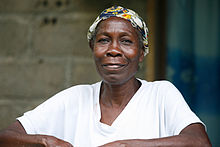Women's rights in Haiti

A Haitian woman
|
|
| Gender Inequality Index | |
|---|---|
| Value | 0.599 (2013) |
| Rank | 132nd out of 152 |
| Maternal mortality (per 100,000) | 350 (2010) |
| Women in parliament | 3.5% (2013) |
| Females over 25 with secondary education | 22.5% (2012) |
| Women in labour force | 60.6% (2012) |
Women in Haiti have equal constitutional rights as men in the economic, political, cultural and social fields, as well as in the family.
However, the reality in Haiti is quite far from the law: "political, economic and social features of Haiti negatively affect most Haitians, but Haitian women experience additional barriers to the full enjoyment of their basic rights due to predominant social beliefs that they are inferior to men and a historical pattern of discrimination and violence against them based on their sex. Discrimination against women is a structural feature in Haitian society and culture that has subsisted throughout its history, both in times of peace and unrest."
Some Haitian scholars argue that Haitian peasant women are often less restricted socially than women in Western societies or even in comparison to more westernized elite Haitian women. They attribute this fact to the influence of African matriarcal systems and of the Haitian Vodou religion which places women at the center of society contrary to purely Judeo-Christian systems. Women priests (named mambos) play equal roles to male priests or Houngan in Haitian vodou.
The sexual equality inherent to Haitian vodou translates into the inclusion of women in all aspects of society. Peasant women specifically, because of their proximity to vodou, have traditionally played a crucial role in Haitian life. Compared to their Latin-American counterparts, the participation of Haitian women in agriculture, commerce and industry has been high. During the US occupation of Haiti (1915-1934) peasant women actively participated in guerilla warfare and anti-US intelligence gathering to free the country. Because of their involvement in commerce, Haitian peasant women have accumulated resources independent of their mates in contrast to more westernized elite Haitian women.
The Haitian government contains a Ministry of Women’s Affairs, but it also lacks the resources to address issues such as violence against women and harassment in the workplace. A number of political figures such as Michele Pierre-Louis, Haiti's second female Prime Minister, have adopted a determined agenda in order to fight inequalities and persecutions against women. Her position in office as Prime Minister has had positive effect on female political leadership in a country where the percentage of women in government at ministerial level was 25% in 2005.
...
Wikipedia
